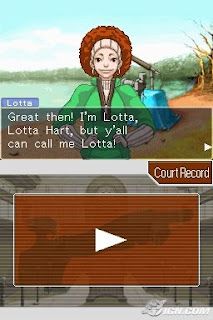
Developer: Capcom
Publisher: Capcom
Release Date: October 11, 2005 (North America)
ESRB Rating: T for Teen
ESRB Notes: Blood, Language, Suggestive Themes, Violence
Before 2001, nobody ever fathomed that a lawyer game would ever be any fun at all. But that was before the world heard the words "Gyakuten Saiban"! The game was a smash-hit, spawning two more sequels on the Game Boy Advance. Then, in 2004, the Nintendo DS was released. Capcom, realizing the potential, quickly ported the series to the new handheld. Noting the extremely positive Japanese reception, Capcom took a little risk and localized the game in North America under the name of Phoenix Wright: Ace Attorney. They expected low sales. They were wrong. Phoenix Wright was a Nation-wide hit, with copies flying off the shelves as soon as they were shipped. Were these amazing sales justified? Was Phoenix Wright really that great? Read on to find out.
The storyline, or rather, the narrative, of Phoenix Wright, is possibly the most important part of the entire game. You play as a lawyer, and thusly, every little phrase spoken needs to be interpreted carefully. Needless to say, this requires some very good storytelling on the game's part.
Each case in the game pretty much follows it's own little storyline. In each case, somebody is accused of murder, and it's up to you, Phoenix Wright, to prove them innocent. Every case is full of lies, secrets, twists and turns, all of which are expertly written.
The writers also have an evidently great sense of humour, as is proven by some of the character's names (An elderly woman is named "Wendy Oldbag", and there's a detective by the name "Dick Gumshoe"). Add to that the endlessly clueless judge and wacky side characters, and you've got a game significantly funnier than anything you've ever seen on Law & Order.
There is also a main storyline weaving it's way through all four of the game's main cases (The fifth case was added in the move from GBA to DS, and is merely "bonus"). Phoenix Wright is a 25 year-old defense attorney fresh out of law school, working at the Fey & Co. law offices run by his mentor, Mia Fey. In the second case Phoenix takes, he meets a legendary prosecutor by the name of Miles Edgeworth. In all his years of being a lawyer, Edgeworth has not lost a single case. His success is clouded by rumours of fabricated evidence, bribes and fixed testimonies. But there seems to be more to this man than that...
And that's where the gameplay comes in! Unlike actual attorneys in real life, Phoenix Wright is tasked with defending his client as well as investigating the crime scenes and interrogating the witnesses. First, the investigation! While visiting a crime scene, your main objective is to collect evidence useful for proving your clients innocence. This often requires visiting many different places, such as the victim's house, workplace and even the scene of the murder itself. On any such screen, you can poke and prod at various objects in the area with the stylus, often resulting in Phoenix describing the object or location to himself, with whoever is nearby usually offering their take on the situation. If the object is significant, it will be taken into evidence.
Another important thing to be done when investigating a crime is interrogating witnesses and talking with detectives. This often yields information about the victims and suspects, as well as sometimes telling you places to check out. On some rare occasions, witnesses may give you evidence or some other item for use later on in your investigation and in the trial itself.
Meeting people also adds their picture and a brief biography to an evidence sub-section called "Profiles". This is useful for keeping track of the many witnesses and such you're bound to meet in any case.
And now for the game's most important part, the court scenes! Legal suits run much quicker in these courts than they do in real life. This is due to the fact that the game takes place in the year 2015, a time when crime is high and court scheduling is tight. By law, no case may last longer than three days in court. After that, the case is taken to a higher court for sentencing (Something that the player will never see).
In every case, there's a victim, a suspect (Your client), a prosecutor, and several witnesses. The witnesses' testimonies are were the gameplay comes in. After each testimony, you have the chance to perform a cross-examination in search of contradictions. It's these contradictions that lead to the witness slipping up and telling you more about what really happened.
In order to find these contradictions, you must carefully examine every word the witness says, as well as look for some different signals. Did the prosecutor just hush the witness? Did the witness just change the subject? Does the testimony line up with the evidence? Finding these signs and exploiting them by presenting evidence or pressing the witness for more information are key to winning any case.
Sometimes if you present evidence in court, the judge or the prosecutor will ask you what in particular is contradictory about the item. This most often requires pointing out a certain line in an autopsy report or calling attention to a certain part of a photograph. Selecting what sentence or part of a picture to present as contradictory takes a lot of careful consideration.
What happens if you present something irrelevant or incorrect? You are swiftly penalized by the judge, and you lose one of five exclamation points representing your "health". If you lose all of five of these, the judge will immediately cease all proceedings and declare your client guilty due to you messing up too many times. After all, if a lawyer can't even present decisive evidence, it pretty much screams that their client is guilty.
 See those exclamation marks in the
See those exclamation marks in thetop-right corner? Those represent health, and
if you lose all of them, it's game over, man.
GAME OVER!
But don't worry too much about losing your health. Every time the judge declares a recess or dismisses proceedings for the day, you fully recover all five points of health. I doubt I'd ever be able to beat the game without this!
There are a few new gameplay elements introduced in the fifth chapter, considering it was built specifically for the DS. I won't spoil anything for you, but basically, if you've ever watched an episode of CSI, you've seen this stuff.
If you like smooth animation and anime-quality movement, you most likely wont like the graphics in Phoenix Wright. But, that being said, there is a real charm to how the characters act. The way each person is drawn in all of their poses gives a sense of personality rivaled in clarity only by the storytelling. Things like Phoenix's nervous sweating and Larry Butz's twitchy and hyperactive expressions really do give an amazingly realistic feel to the characters, regardless of how clunky their animation is.
And besides, this is a direct port of a Game Boy Advance game, a system with less than half of the Nintendo DS' graphical capabilities. Adding in smoother animation or different sprites altogether would violate the original game's classic feel. There are some more complex animations in the DS-exclusive chapter, but you can't help but notice how out of place some of them seem. In the end, the animation, while hardly smooth, is still great at portraying emotion and drama.
The audio in this game is amazing. But you probably already knew that, because of Phoenix Wright's presence in this recent music-related article. The music in this game is tense, light-hearted and eerie in all the right places. I could listen to the interrogation and Steel Samurai music for hours on end and feel very little boredom. Memorable and high-quality music all around!
The sound effects in this game are also hardly worth sneezing at. From the smashing gavel to the desk pounding, it's all incredibly realistic and crystal-clear. Some of the characters even have small amounts of audible speech! Almost every important interjection in court is voiced. "Objection!", "Hold it!" and "Take that!" are all said with great emotion and clarity.
Despite what many people say, I think this game boasts some great longevity indeed. Completing Phoenix Wright for the first time is bound to take upwards of 20 hours. And there is, in fact, some replay value to this game. By the time you burn through the whole thing and finish the last chapter, chances are you've forgotten so much about the earlier cases that they feel brand new again. That being said, this game has nearly infinite replayability.
OVERALL
Storyline: 9.5/10
The mini-storylines of each case are all written very well, and the main story helps tie it all together very well. However, the fifth chapter does feel a little tacked on, due to it being added in the porting process. The humour definitely makes up for any shortcomings in this department, though!
Gameplay: 9.5/10
Playing Phoenix Wright is an experience unmatched thus far by any other video game. The overall level of immersion is amazing, and presenting the correct evidence to win a case feels extremely rewarding. Amazingly fun to play.
Graphics: 8.5/10
Every character's animations exude great emotion and character, but the actual movement is somewhat clunky. Nonetheless, the art style is amazing. Some of the 3D aspects of the fifth chapter feel a little out of place, though.
Audio: 8.5/10
As I've said in the Best game music ever article, the soundtrack to this game is amazingly high quality. The tension and atmosphere created by the music in this game is amazing. The sound effects and partial voice acting are pretty great, too. A little more voice acting would be nice, though.
Longevity: 9.0/10
Beating this game the first time around is sure to take even the best of gamers more than 20 hours, 15 at the least. Once that's done, going back and replaying the semi-forgotten first cases is still quite fun. After a few runs, though, I could see this game getting a little stale. When this happens, shelve it, wait a few months, and play it again!
OVERALL: 9.0/10
Phoenix Wright: Ace Attorney is a masterpiece of a game. Capcom took one of the most boring occupations in the world and turned it into a virtual thrill ride of lies, secrets and plot twists. However, this game is definitely not for everyone. Beating any case takes some extreme patience and perception, so the hyper and action-loving need not apply here.
Tonight's second article will be up later, folks!
The Duck Has Spoken.




No comments:
Post a Comment